Related Research Articles

Naguib Mahfouz Abdelaziz Ibrahim Ahmed Al-Basha was an Egyptian writer who won the 1988 Nobel Prize in Literature. In awarding the prize, the Swedish Academy described him as a writer “who, through works rich in nuance – now clear-sightedly realistic, now evocatively ambiguous – has formed an Arabian narrative art that applies to all mankind”. Mahfouz is regarded as one of the first contemporary writers in Arabic literature, along with Taha Hussein, to explore themes of existentialism. He is the only Egyptian to win the Nobel Prize in Literature. He published 35 novels, over 350 short stories, 26 screenplays, hundreds of op-ed columns for Egyptian newspapers, and seven plays over a 70-year career, from the 1930s until 2004. All of his novels take place in Egypt, and always mention the lane which equals the world. His most famous works include The Cairo Trilogy and Children of Gebelawi. Many of Mahfouz's works have been made into Egyptian and foreign films; no Arab writer exceeds Mahfouz in number of works that have been adapted for cinema and television. While Mahfouz's literature is classified as realist literature, existential themes appear in it.

William Cuthbert Faulkner was an American writer. He is best known for his novels and short stories set in the fictional Yoknapatawpha County, Mississippi, a stand-in for Lafayette County where he spent most of his life. A Nobel laureate, Faulkner is one of the most celebrated writers of American literature and often is considered the greatest writer of Southern literature.
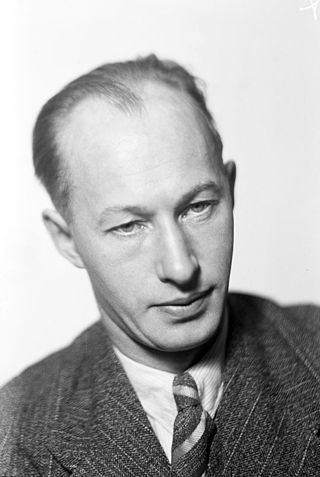
Eyvind Johnson was a Swedish novelist and short story writer. Regarded as the most groundbreaking novelist in modern Swedish literature he became a member of the Swedish Academy in 1957 and shared the 1974 Nobel Prize in Literature with Harry Martinson with the citation: for a narrative art, far-seeing in lands and ages, in the service of freedom.

American literature is literature written or produced in the United States and in the colonies that preceded it. The American literary tradition is part of the broader tradition of English-language literature but also includes literature produced in languages other than English.

Absalom, Absalom! is a novel by the American author William Faulkner, first published in 1936. Taking place before, during, and after the American Civil War, it is a story about three families of the American South, with a focus on the life of Thomas Sutpen.
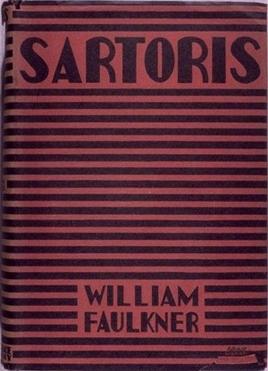
Sartoris is a novel, first published in 1929, by the American author William Faulkner. It portrays the decay of the Mississippi aristocracy following the social upheaval of the American Civil War. The 1929 edition is an abridged version of Faulkner's original work. The full text was published in 1973 as Flags in the Dust. Faulkner's great-grandfather William Clark Falkner, himself a colonel in the American Civil War, served as the model for Colonel John Sartoris. Faulkner also fashioned other characters in the book on local people from his hometown Oxford. His friend Ben Wasson was the model for Horace Benbow, while Faulkner's brother Murry served as the antetype for young Bayard Sartoris.
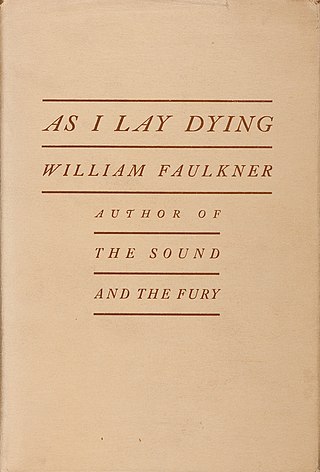
As I Lay Dying is a 1930 Southern Gothic novel by American author William Faulkner. Faulkner's fifth novel, it is consistently ranked among the best novels of the 20th century. The title is derived from William Marris's 1925 translation of Homer's Odyssey, referring to the similar themes of both works.
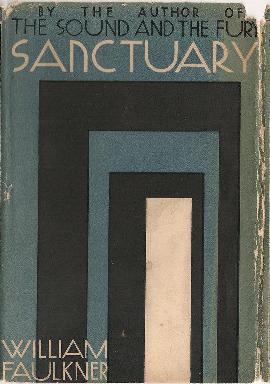
Sanctuary is a 1931 novel by American author William Faulkner about the rape and abduction of an upper-class Mississippi college girl, Temple Drake, during the Prohibition era. The novel was Faulkner's commercial and critical breakthrough and established his literary reputation, but was controversial given its themes. It is said Faulkner claimed it was a "potboiler", written purely for profit, but this has been debated by scholars and Faulkner's own friends.

Intruder in the Dust is a 1948 crime novel written by American author William Faulkner. Taking place in Mississippi, it revolves around an African-American farmer accused of murdering a Caucasian man.
"Barn Burning" is a short story by the American author William Faulkner which first appeared in Harper's in June 1939 (pp. 86–96) and has since been widely anthologized. The story deals with class conflicts, the influence of fathers, and vengeance as viewed through the third-person perspective of a young, impressionable child. It precedes The Hamlet, The Town, and The Mansion, the three novels that make up Faulkner's Snopes trilogy.

The Hamlet is a novel by the American author William Faulkner, published in 1940, about the fictional Snopes family of Mississippi. Originally a standalone novel, it was later followed by The Town (1957) and The Mansion (1959), forming the Snopes trilogy.

The Mansion is a novel by the American author William Faulkner, published in 1959. It is the last in a trilogy of books about the fictional Snopes family of Mississippi, following The Hamlet and The Town.

The Long, Hot Summer is a 1958 American drama film starring Paul Newman, Joanne Woodward, Anthony Franciosa and Orson Welles. It was directed by Martin Ritt, with a screenplay by Irving Ravetch and Harriet Frank Jr., based in part on three works by William Faulkner: the 1931 novella "Spotted Horses", the 1939 short story "Barn Burning" and the 1940 novel The Hamlet. The title is taken from The Hamlet, as Book Three is called "The Long Summer". Some characters, as well as tone, were inspired by Tennessee Williams' 1955 play, Cat on a Hot Tin Roof, a film adaptation of which – also starring Newman – was released 5 months later.
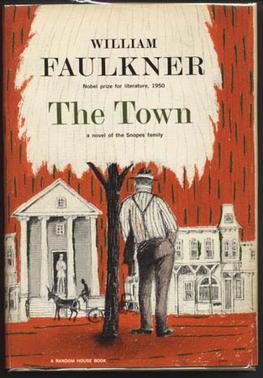
The Town is a novel by the American author William Faulkner, published in 1957, about the fictional Snopes family of Mississippi. It is the second of the "Snopes" trilogy, following The Hamlet (1940) and completed by The Mansion (1959).
"Spotted Horses" is a novella written by William Faulkner and originally published in Scribner's magazine in 1931. It includes the character Flem Snopes, who appears in much of Faulkner's work, and tells in ambiguous terms of his backhand profiteering with an honest Texan selling untamed ponies. "Spotted Horses" was later incorporated into The Hamlet under the title "The Peasants: Chapter One".

Irving Dover Ravetch was an American screenwriter and film producer who frequently collaborated with his wife Harriet Frank Jr.
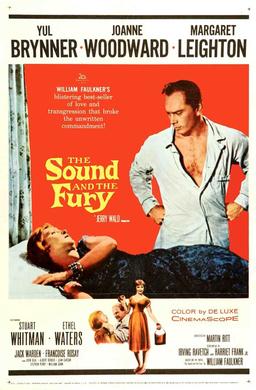
The Sound and the Fury is a 1959 American drama film directed by Martin Ritt. It is loosely based on the 1929 novel of the same title by William Faulkner.

William Faulkner (1897—1962) was an American writer who won the 1949 Nobel Prize in Literature. He is best known for his novels and short stories set in the fictional Yoknapatawpha County, a stand-in for his hometown of Oxford in Lafayette County, Mississippi.
Family Trilogy is a trio of plays by Sam Shepard which critics consider thematic. It may also refer to:
Gavin Stevens is a lawyer and the county attorney in Jefferson in Faulkner's fictional Yoknapatawpha County, Mississippi. He was educated at Harvard and Heidelberg universities.
References
- 1 2 John B. Padgett. "A Faulkner Glossary: S", William Faulkner on the Web, October 9, 2000. Retrieved on May 7, 2008. "Snopes: One of the most pernicious families in all of Faulkner.... the seemingly endless number of Snopes who parade through Faulkner’s fiction, most especially in the Snopes trilogy (the novels The Hamlet, The Town, and The Mansion)...."
- ↑ From Nobel Lectures, Literature 1901–1967, Editor Horst Frenz, Elsevier Publishing Company, Amsterdam, 1969. Reprinted at "William Faulkner: Biography", Nobel Foundation, 1949. Retrieved May 7, 2008. "In 1940, Faulkner published the first volume of the Snopes trilogy, The Hamlet, to be followed by two volumes, The Town (1957) and The Mansion (1959), all of them tracing the rise of the insidious Snopes family to positions of power and wealth in the community."